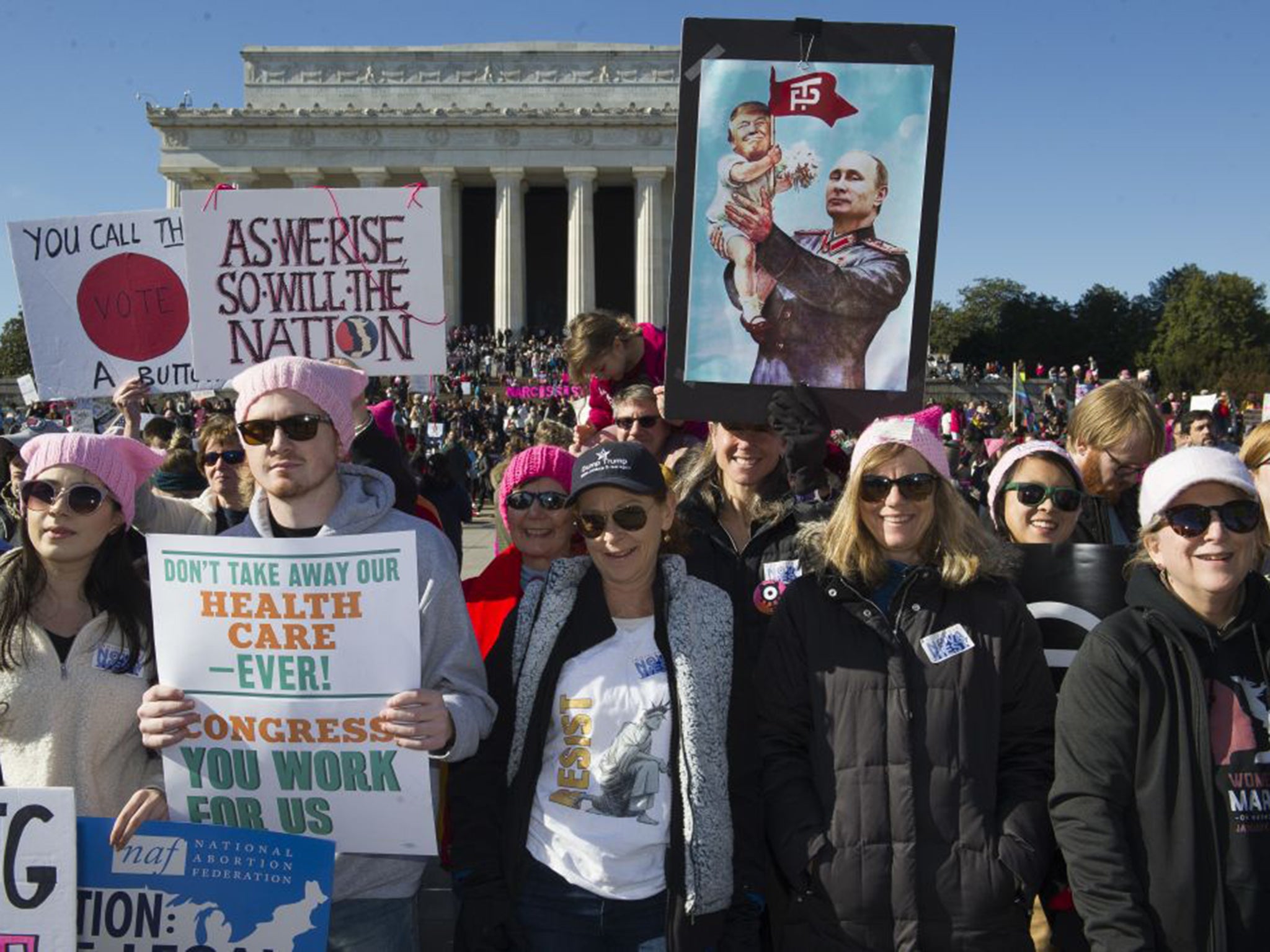Women’s march: Thousands protest against Donald Trump’s ‘racism’ and ‘misogyny’
The mass demonstrations were held on the first anniversary of the President’s inauguration

Your support helps us to tell the story
From reproductive rights to climate change to Big Tech, The Independent is on the ground when the story is developing. Whether it's investigating the financials of Elon Musk's pro-Trump PAC or producing our latest documentary, 'The A Word', which shines a light on the American women fighting for reproductive rights, we know how important it is to parse out the facts from the messaging.
At such a critical moment in US history, we need reporters on the ground. Your donation allows us to keep sending journalists to speak to both sides of the story.
The Independent is trusted by Americans across the entire political spectrum. And unlike many other quality news outlets, we choose not to lock Americans out of our reporting and analysis with paywalls. We believe quality journalism should be available to everyone, paid for by those who can afford it.
Your support makes all the difference.Thousands of protesters have turned out in cities across the US and beyond to mark Donald Trump’s first anniversary by demanding equal rights for women and denouncing misogyny and racism.
From Washington DC to Chicago and from California to Japan, crowds of women and their supporters turned out, seeking to channel activism into political change as America looks ahead to crucial midterm elections in November.
“He refuses to cooperate with us,” said one protester, Terri Parsons from Winslow, Arizona, who travelled to the nation’s capital to demonstrate against what she termed Mr Trump’s regressive views. “I think he wants to take us back to the 1950s.”
Another protester, Helina Zewdu, 35, who works for a non-profit group and is originally from Ethiopia, said she was disgusted by Mr Trump’s reported comments in which he is said to have described Haiti and African countries as “s***hole” nations.
“I think it’s unconscionable that the President of the US should use language like that,” said Ms Zewdu, who applying for US citizenship.
Her friend, Mahnaz Mojahed, originally from Iran, had come to the US to study and was now a citizen. Yet because Iran is one the countries included in the President-backed travel ban – which is to be heard by the Supreme Court – her parents are unable to visit her here. “If I get hit by a bus, they will not be able to come and see me,” she said.
A year after up to 500,000 people descended on Washington DC the day after Mr Trump’s inauguration – in protests that became known as the Women’s March – people returned to make their voices heard.
The protests – which took in anti-racism, women’s rights as well as economic inequality – took on additional significance this year following the #MeToo movement, that has encouraged women to share stories of sexual abuse and harassment. The movement took off in the aftermath of allegations of abuse levelled at film producer Harvey Weinstein, allegations he has denied.
Tracey and Steven Weeks, from Maryland, were among the crowds who gathered at the Reflecting Pool in front of the Lincoln Memorial in Washington.
“We’re going to stand up and we’re not going to stop,” said Ms Weeks. “As women we’re often being told to stop and be silent. But we’re here to keep it up.”
Organisers said they were determined that the energy and passion that went into creating banners and placards would also have a political impact. Since Mr Trump entered the Oval Office, a record number of women have registered to compete in elections this year, both for national office and in local elections.
“We will make our message heard at the polls this [autumn],” Emily Patton, a rally organiser, told thousands of demonstrators at the Reflecting Pool.
“That is why we are urging people to register to vote today.”
The Washington rally featured Democratic politicians from neighbouring Virginia, including Senator Tim Kaine, who blamed Trump and Republicans for the shutdown of the government on Saturday.
“The Trump shutdown is due to the inability of the Republican Party to do basic governing, like making a budget,” he said.
Many of the protesters wore pink knit “pussy hats”, which were created for last year’s march as a reference to a comment made by Mr Trump about female genitalia. The caps quickly became a symbol of women’s empowerment and opposition to the new President in the early days of his administration.
“We want to continue the fight to resist this President and the policies we’re against,” said Sara Piper, 59, a geologist from Reston, Virginia.
Gary Lin, from Arlington, was among many men at the rally. He said the only previous protest he had taken part in was in 2009. Yet he said after Mr Trump’s election victory, he felt he could not stay away.
“Organisation is the key,” said the computer technologist.
In Palm Beach, Florida, home to Mr Trump’s Mar-a-Lago estate, several hundred people gathered carrying anti-Trump signs as they prepared to march as part of Saturday’s planned protests.
“Beautiful weather all over our great country, a perfect day for all Women to March,” Mr Trump wrote on Twitter.
Join our commenting forum
Join thought-provoking conversations, follow other Independent readers and see their replies
Comments